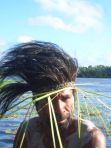C Indigenous people prevent carbon emissions through their stewardship of forests and pristine environments, a side event at the COP 21 summit heard. A study presented at COP 21’s Global landscapes forum showed that indigenous people oversee around a fifth of the world’s carbon stock, in the form of tropical forests. Altogether, 168 billion tonnes of carbon are stored on indigenous lands — around three times the world’s annual emissions — and this is in danger of being released if the societies looking after these lands are not strengthened, the study found.
Indigenous people prevent carbon emissions through their stewardship of forests and pristine environments, a side event at the COP 21 summit heard. A study presented at COP 21’s Global landscapes forum showed that indigenous people oversee around a fifth of the world’s carbon stock, in the form of tropical forests. Altogether, 168 billion tonnes of carbon are stored on indigenous lands — around three times the world’s annual emissions — and this is in danger of being released if the societies looking after these lands are not strengthened, the study found.
“We know that the respect and recognition of indigenous people’s rights, land tenure and traditional knowledge have contributed to more sustainable use and management of various ecosystems and landscapes,” said Grace Balawag, the deputy coordinator of the Indigenous Peoples’ Partnership on Climate Change, Forests and Sustainable Development. The study was presented at the 5 December event in Paris, France, by an alliance of indigenous peoples’ groups from Africa, Asia and Latin America. It was discussed alongside several research papers and initiatives highlighting the role that indigenous people play in preventing the destruction of forests and the release of large carbon stocks. Forest cover is essential for absorbing and retaining the powerful greenhouse gas carbon dioxide, the 3,000 forum delegates were told. Protecting and enlarging forested areas would remove more CO2 from the air, an essential part of attempts to stem global warming. “The world has never had such strong evidence of the role of indigenous peoples in conserving the forests that represent the one existing solution to climate change,” said Abdon Nababan, secretary general of the Indigenous Peoples Alliance of the Archipelago, an Indonesian NGO. But the event also heard that indigenous communities face problems in getting their role in climate stewardship recognised, as many are poor and lack official rights to their land and access to the legal system.


